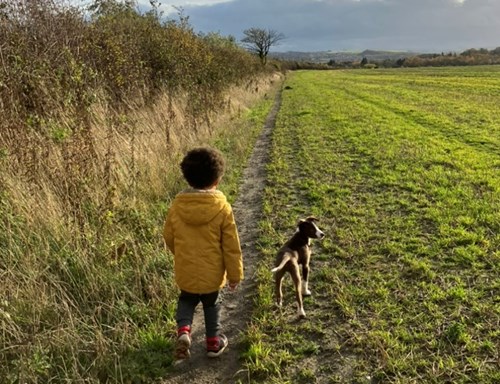Benji's delayed diagnosis
Published Date: 16 Feb 2023
We had been waiting in the silent soundproof room, surrounded by fancy equipment and purposeful toys, for a while before the audiologist and speech therapist came back in and sat down. Without wanting to delay after a long afternoon of testing and waiting, they came out with it quickly: “Benjamin has hearing loss…”.
I hadn’t expected it, after previously being told his hearing was fine, so I was totally taken aback and missed most of what they said after it. What came next was a rush of relief washing over me like a crashing wave, and I couldn’t stop the tears flooding from my eyes.
Relief might not be the first emotion you think of when a parent hears their child’s diagnosis, but those of you who have experienced delayed diagnosis might understand or have experienced the same.
I had known something was going on with my wee boy since he was born – my ‘mother’s instinct’ told me so – but to find out that he was deaf clicked a lot of things into place. It also meant that a door to support had finally opened up.
Knowing your child is struggling, but being clueless and powerless over how best to help them, is agonising. The years before Benji was diagnosed were full of sleepless nights worrying, knowing that he needed support but not sure what. I felt I was failing him.
As a family we struggled with, what we now understand was, a massive barrier to communication. The delayed diagnosis has had massive impact on him, and on our family, and the reality is that he might not ‘catch up’. Some days I still feel engulfed by anger over the lost time, and the mum guilt can feel unbearable. When that happens, I try to focus on practical things I can do to support him.
Knowing that Benji is deaf gave us tangible options for supporting him. Underprepared but with fingertips Google-ready, we set about learning what we could about deafness. I would watch signed stories on YouTube, not realising the difference between Sign Supported English and British Sign Language (BSL). I didn’t know that BSL was a full language with a grammatical structure different to English. We didn’t really even have any idea of deaf awareness. We quickly found out that it was hard for Benji to follow us when we didn’t let him know we had started talking to him. We also found out that lighting and positioning in conversation affected how well he could join in.
Benji couldn’t sign or speak when he was diagnosed, but learning BSL was a game changer for us all. We could see how much he had been missing.
Getting his diagnosis was a relief. It was also a shock and, over the days and weeks that followed, was a case of learning to navigate the unknown. As a hearing family, learning another culture and language has been a lot. It has been, at times, overwhelming, but also exciting and fun. Learning together has been a great way of bringing our family together. We have found other families of deaf children local to us, and deaf adults who show us the full lives they lead. We also now have a team in place for his support in education. So now deafness doesn’t seem the scary prospect that it once did.
Benji is profoundly deaf and is also a clever, cheeky, funny wee boy, just like he was always meant to be. I couldn’t be more proud.
